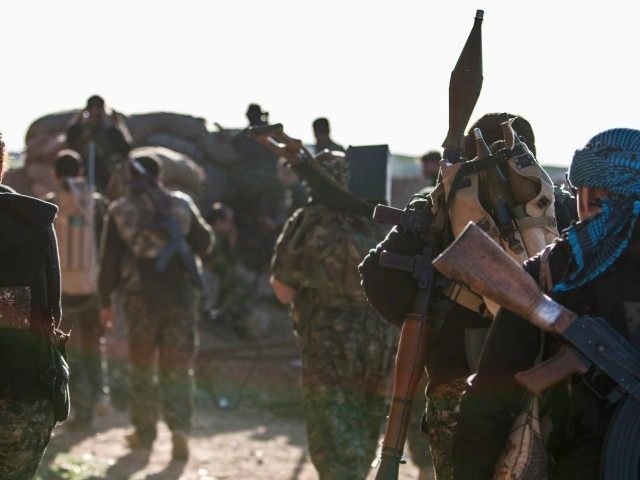A dispute has arisen in Syria over the disposition of a fifty-ton ammunition shipment from the United States, supposedly intended for Syrian Arab rebel groups. The munitions were instead taken by the Kurdish YPG militia, according to both Arab and Kurdish commanders, although the Pentagon officially insists the shipment reached its intended recipients.
It is an unwelcome note of confusion when Russia’s bombing campaign and Iranian ground forces leave the fate of the Syrian rebellion in question and a major operation to take the ISIS capital of Raqqa is supposed to be in the works.
According to a report by the Washington Post, Arab fighters are “fired up” by Washington’s announcement that an operation to recapture Raqqa from the Islamic State will be “the next focus of the war.”
However, they insist there is no sign of the weapons the United States promised to deliver, because the Kurds took the major ammunition drop that was intended for them. More specifically, the supplies were claimed by a brand-new “umbrella group” called the Syrian Democratic Forces, which announced itself literally the day the ammo drop was made and is mostly comprised of Kurdish YPG forces, who outnumber Arab and Syrian fighters by 4 to 1.
“The Syrian Democratic Forces will decide which front the weapons will be given to, where the battle will be fought and who will get the weapons,” declared one of the new umbrella group’s commanders, Haki Kobane. He did not sound committed to the notion of a grand offensive against Raqqa, complaining that a mere fifty tons of ammunition “is not enough to do anything,” because his forces are “fighting along a 700-kilometer front line.”
The dispute over this ammo drop is problematic for several reasons, including Turkey’s apprehension over Kurdish military strength and possible territorial ambitions. Also, the Syrian Arabs’ have lingering doubts that the Kurds will fight hard to reclaim Sunni Arab territory such as Raqqa—”a city the Kurds do not aspire to govern,” as the Washington Post puts it.
To put it bluntly, the Turks fear the Kurdish YPG will pass weapons to the PKK insurgents Turkey is currently fighting, perhaps with the long-term goal of carving out a slice of Turkey to include in a Greater Kurdistan. The Syrian Arabs fear the Kurds are primarily interested in kicking ISIS out of their territory, lacking both the will and capability to mount a huge battle to evict ISIS from Raqqa.
The Syrian rebels do not think they can take Raqqa without more powerful weapons; one officer quoted by the Washington Post said they need boots, pointing out that his own feet were clad in plastic sandals. The Kurds have long complained they are being under-supplied, while they are simultaneously expected to handle the toughest ground fighting against ISIS.
All of these factions have reason to believe they would emerge from the bloody campaign to liberate Raqqa only to find the Syrian rebellion largely crushed, and Bashar Assad firmly in control of Damascus, at which point he would mostly likely take the keys to Raqqa. This is an outcome the Kurds appear to be significantly more comfortable with than the Turks or Syrian rebels.
If the planned Raqqa offensive disintegrates into factional rivalries, it would be another stunning blow for the Obama administration, which is already coping with the embarrassment of its much-touted $500 million plan to train an all-conquering, carefully vetted, U.S.-aligned Syrian rebel force. “Syrian rebels balked at requirements that they abandon the fight against President Bashar al-Assad, and all but a dozen or so of the 130 who did receive the training were kidnapped by al-Qaeda, defected or deserted,” says the Washington Post post-mortem of this failed strategy, tacitly acknowledging that the mysterious fate of the second wave of New Syrian Force fighters most likely did involve desertion, despite Pentagon denials last month.
The new plan involves arming select groups with agreeable ideology and proven fighting ability. The long-standing concern with plans to arm such groups is that American weapons will fall into the hands of terrorists. Losing control of a major ammo shipment would bolster those fears. Furthermore, the Washington Post notes that the Kurdish YPG has begun suffering criticism from human-rights groups for allegedly driving Arab villagers from their homes during its push across Syria, charges the Kurds deny.
The Pentagon, as mentioned above, is adamant that it did not lose control of the fifty-ton ammunition shipment.
“This successful airdrop provided ammunition to Syrian groups whose leaders were appropriately vetted by the United States and have been fighting to remove ISIL from northern Syria,” Defense Department spokeswoman Commander Elissa Smith told Breitbart News in an exclusive statement. “The airdrop includes small arms ammunition. Due to operational security we will not have any further details about the groups that received these supplies, their location, or the type of equipment in the airdrop.”
“This airdrop supported Arab groups. We share the concern of our Turkish partners over the sensitivity of expanding Kurdish control into traditionally non-Kurdish areas in Syria,” Smith added, directly addressing one of the major concerns over the fate of the shipment.
“We are very confident in our ability to deliver cargo to its intended location,” she asserted. “We have no indication that ISIL was able to intercept any of these supplies. This ammunition will enable anti-ISIL forces to continue their offensive against ISIL by disrupting their command and control and their freedom of maneuver.”
This would seem to directly contradict what the Kurds and Syrians told the Washington Post, although it is noteworthy that delivering the supplies to their precise intended location does not mean it was received by the intended group, and while saying ISIS didn’t get the ammunition is comforting, it does not mean the Kurdish YPG or their new 80 percent Kurdish “umbrella group” won’t be the ones throwing those bullets at the Islamic State.

COMMENTS
Please let us know if you're having issues with commenting.